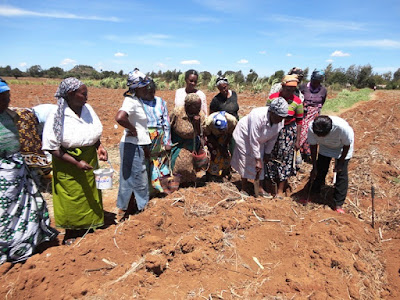By Bob Aston
He said that most of the County economic pillars are related to Agriculture. He noted that the County Government is investing heavily in the dairy value chain and already 3 milk coolers with a capacity of 10,000 litres each have been given to dairy cooperatives while 3 more coolers with a capacity of 5,000 litres each will be given out soon.
“Most farmers have been involved in agriculture as a hobby instead of business. We have to embrace agribusiness as a County. We have to ensure that farmers do meaningful business and that as a County we are able to influence the maize market,” said Governor Irungu.
Laikipia County Maize and
Dairy Value chain farmers held a meeting with Laikipia Governor Joshua Irungu
at his homestead in Kinamba, Githiga Ward on July 24, 2015. The meeting was
held to brief the Governor on the progress that the two value chains have made
as well as deliberate on challenges and possible solutions in the two value chains.
During the meeting it was
noted that the value of Laikipia County maize is approximated at 3.4 billion
kshs and that the effect of Maize Lethal Necrosis Disease has not been reported
in the County this season.
Governor Irungu noted
that such forums are always useful as the County Government is able to know
what farmers needs to be addressed. He said that Laikipia has enormous
potential that needs to be tapped to ensure that communities improve their
livelihood.
 |
| Governor Irungu addressing the two value chain stakeholders |
He said that most of the County economic pillars are related to Agriculture. He noted that the County Government is investing heavily in the dairy value chain and already 3 milk coolers with a capacity of 10,000 litres each have been given to dairy cooperatives while 3 more coolers with a capacity of 5,000 litres each will be given out soon.
“Most farmers have been involved in agriculture as a hobby instead of business. We have to embrace agribusiness as a County. We have to ensure that farmers do meaningful business and that as a County we are able to influence the maize market,” said Governor Irungu.
He said that plans are
underway to get a hay balers for Muhotetu area. On the same sector the county
government is also promoting dorper sheep breed in Laikipia North.
Mr. Waweru Kanja,
Chairman Maize Value Chain Core Group informed the Governor that 43 Maize Value
Chain groups in the County formed Laikipia Maize Value Chain Development
Network with an aim of improving organization and co-ordination of the maize
value chain in the County as well as championing the collective interests of
the value chain players. This is towards enhancing a viable and equitable
commercialization of the maize value chain.
Mr. Kanja noted that some
of the issues that the County government needs to address include: late distribution
of subsidized government fertilizer; lack of market for farmer produce; and
lack of good cereals storage facilities in most parts of the County.
Others include: lack of
collateral for smallholder farmers to access business funds; soil testing and
training of farmers; lack of agricultural research facilities in the County;
and involving agriculture stakeholders when preparing County budget.
He said that constraints
in the maize value chain include: high post-harvest losses at an average of 30
percent; poor quality of inputs; high cost of inputs; low soil fertility;
frequent droughts; wildlife conflicts; limited access to information; and low
adoption of appropriate technology.
Other constraints
include: limited accessibility to financial services; pest and disease
incidents; poor infrastructure; and high cost of unskilled labour.
 |
| Governor Irungu posing for a photo with the two value chain stakeholders |
He said that activities
earmarked in the maize value chain this year and early next year include: to
increase adoption of climate smart production by maize value chain actors
including vulnerable groups; to increase equitable access to market; improving
adoption of on-farm and community grain storage technologies; and to strengthen
capacity of maize value chain groups.
On his part, Mr. John
Kimani said that the dairy value chain with a membership of over 6,000 farmers is
striving to support consistent supply of standardized branded quality hay from
Laikipia County, reduction of spoilage and promotion of value addition of milk.
This year the dairy and
hay value chain stakeholder’s are concentrating on capacity development of
dairy and hay farmers, supporting development of business plans for farmers,
undertaking waste disposal and management, supporting value addition and
product development, training on dairy husbandry technologies and training on
hay production, harvesting and storage.
Mr. Kimani said that
challenges experienced by dairy farmers include: inadequate feeds;
pest/diseases; poor quality inputs; fluctuation of milk prices; poor breeds;
perishability of milk; and low adoption of existing technologies.
Others include: limited
access to information; unpredictability of weather patterns; high cost of
inputs; low value addition of milk; and inadequate access to finance.
He requested the county
government to fast track operationalization of milk coolers that they had
provided. He also requested the County government to support value addition,
dairy exhibition day, support strengthening of the Laikipia Hay Company as well
as helping to integrate youths in the dairy value chain by developing all the
value chains as agriculture business hubs.
Governor Irungu promised
that the County Government will address the issues addressed. He noted that
some of the issues could have been addressed in the County budget if they had
been raised earlier.






